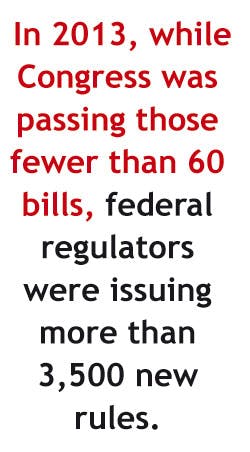The Competitive Edge: Handicapping Manufacturers' Legislative Priorities in 2014
In 1948, a frustrated President Truman labeled the gridlocked legislative body at the other end of Pennsylvania Avenue the "do nothing" United States Congress. Some have taken to branding the 113th Congress similarly. But that seems unfair to the politicians of 66 years ago -- after all, this 113th Congress has actually done less than the do-nothings.
See Also: Global Manufacturing Economy Trends & Analysis
During 2013 Congress passed fewer than 60 bills. According to an analysis in Politico, in the last six decades only four Congresses have passed fewer than 100 laws by a similar point in the legislative calendar (including twice in the past four years). So what happens to manufacturers' laundry list of policy priorities, many of which have been shoved to backburners due to politics and other events? Unfortunately, with a divided government, the odds are weighted heavily against most getting enacted prior to the 2014 midterm elections.
Immigration Reform. Manufacturers see immigration reform as a competitiveness issue: With a shortage of skilled and high-tech workers, a select group of immigrants can fill the gaps where American workers aren't available. Last summer the U.S. Senate handily passed its version of the law, which includes changes in the legal system to allow businesses to hire and keep more high-tech and low-skill workers from abroad. In the House, Speaker John Boehner insists that now that a budget compromise has been enacted, immigration reform is a priority. The hurdle is that many House Republicans oppose a provision in the Senate version of the bill that provides a path for the nation's 12 million undocumented immigrants to apply for U.S. citizenship. The speaker would like to move this legislation long before the November elections, but GOP lawmakers facing potential primary challenges could gum up the works for House passage.
Odds for enactment: 2:1
Tax Reform. Not only do we have the highest tax rate in the industrial world, but of the G-7 countries only the United States has a worldwide tax system, in which U.S. corporations must pay tax on all income regardless of where it is earned in the world.
Faced with a clearly anti-competitive tax system, in 2013 Sen. Max Baucus, D-Mont., and Rep. Dave Camp, R-Mich., the chairs of the Senate Finance Committee and the House Ways and Means Committee, respectively, announced their intention to overhaul the tax code. But business leaders have balked at both Camp's and Baucus' initial plans. As a result, no comprehensive tax reform bills were introduced in the first session of the 113th Congress.
Sen. Baucus doesn't have multiple years to commit to the effort: Not only will he retire from the Senate at the end of this year, President Obama is expected to nominate him as the next ambassador to China. Considering the critical role Baucus plays in moving this legislation, it would take a tremendous bipartisan effort to get comprehensive reform through the Senate, much less the Congress, in 2014.
Odds for enactment: 25:1
Regulatory Reform
Regulatory Reform. In 2013, while Congress was passing those fewer than 60 bills, federal regulators were issuing more than 3,500 new rules. Nothing is more important to manufacturers than creating a less arbitrary, more accountable regulatory system. But while several major reform initiatives have been introduced, only one has any chance of reaching the president's desk this year.
The Regulatory Improvement Act of 2013 would establish a Regulatory Improvement Commission to review and potentially modify or repeal outdated regulations. The Democratic-leaning Progressive Policy Institute played a major role in creating the framework for the proposed commission, and the bill has some bipartisan support.
Odds for enactment: 10:1.
Two other bills are long shots. The Regulatory Accountability Act would compel agencies to look for more efficient alternatives and would give OMB oversight of independent agencies and commissions (authority that OMB does not currently have). Labor and environmental groups are steadfastly opposed to the measure. Odds are 50 to 1 for enactment. The Regulations from the Executive in Need of Scrutiny (REINS) Act would require agencies to send any rule with an estimated impact of more than $100 million back to Congress for an up or down vote. Too many in Congress would prefer not to be under that kind of spotlight.
Odds for enactment: 50:1
Trade Promotion Authority. Between 1975 and 2008 all presidents enjoyed the flexibility of so-called “fast track” authority, which streamlines the trade negotiation process by allowing the White House to negotiate trade agreements without a threat of congressional amendment.
In December, Senate and House committee leaders on both sides of the aisle signed off on an agreement to support a TPA bill. Legislation should be introduced this month. The timing is important, because the White House has expressed an interest in pushing through negotiations in the Trans-Pacific Partnership. Expect significant opposition from labor and environmental groups, as well as from intellectual property rights supporters. Also expect push-back from members of both parties because TPA precludes congressional input in both the transpacific and transatlantic trade agreements currently being considered. But considering the White House support for the policy, and long-standing Republican support, prospects for passage are favorable.
Odds for enactment: Even
About the Author

Stephen Gold
President and Chief Executive Officer, Manufacturers Alliance
Stephen Gold is president and CEO of Manufacturers Alliance. Previously, Gold served as senior vice president of operations for the National Electrical Manufacturers Association (NEMA) where he provided management oversight of the trade association’s 50 business units, member recruitment and retention, international operations, business development, and meeting planning. In addition, he was the staff lead for the Board-level Section Affairs Committee and Strategic Initiatives Committee.
Gold has an extensive background in business-related organizations and has represented U.S. manufacturers for much of his career. Prior to his work at NEMA, Gold spent five years at the National Association of Manufacturers (NAM), serving as vice president of allied associations and executive director of the Council of Manufacturing Associations. During his tenure he helped launch NAM’s Campaign for the Future of U.S. Manufacturing and served as executive director of the Coalition for the Future of U.S. Manufacturing.
Before joining NAM, Gold practiced law in Washington, D.C., at the former firm of Collier Shannon Scott, where he specialized in regulatory law, working in the consumer product safety practice group and on energy and environmental issues in the government relations practice group.
Gold has also served as associate director/communications director at the Tax Foundation in Washington and as director of public policy at Citizens for a Sound Economy, a free-market advocacy group. He began his career in Washington as a lobbyist for the Grocery Manufacturers of America and in the 1980s served in the communications department of Chief Justice Warren Burger’s Commission on the Bicentennial of the U.S. Constitution.
Gold holds a Juris Doctor (cum laude) from George Mason University School of Law, a master of arts degree in history from George Washington University, and a bachelor of science degree (magna cum laude) in history from Arizona State University. He is a Certified Association Executive (CAE).


